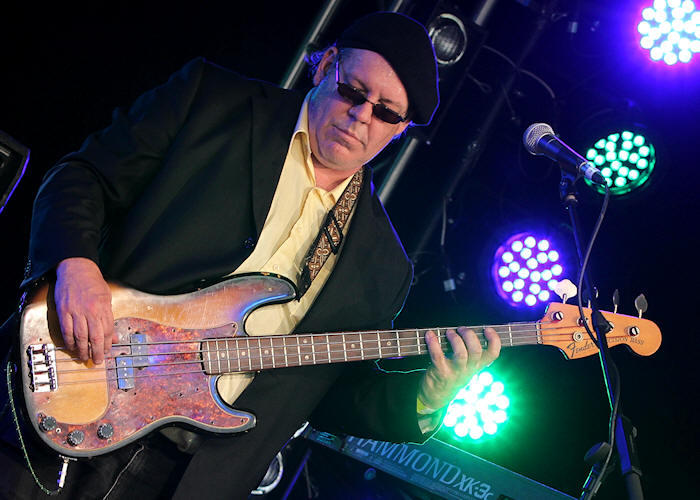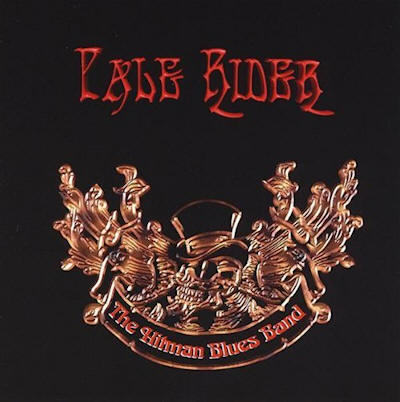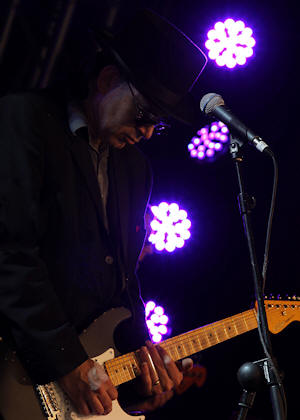
Painting © 2004 Loz
Arkle
Website
© Copyright 2000-2011 Alan White - All
Rights Reserved
Site optimised for Microsoft Internet Explorer
Early Blues Interview
|
|
"For twenty years, The
Hitman Blues Band has been rocking the New York area with their searing
brand of blues/rock, drawing favourable comparisons to Johnny Winter,
Joe Bonamassa, and Kenny Wayne Sheppard along the way. Led by founding
member, guitarist/singer Russell “Hitman” Alexander, the band has made
various personnel changes along the way, but Alexander remains the
constant with his gravelly vocals and gritty blues fretwork". Following The Hitman Blues Band's success on the main stage at the Maryport Blues Festival, I was fortunate in arranging an interview with Russell "Hitman" Alexander:
Russell: I come from New York City. My first musical memories are of my father, who was a professional jazz musician, playing at one of his gigs. I was sitting at a table in the club, about four years old, trying to figure out the beat.
Alan: Did you come from a musical family - is
there a long musical heritage? Alan: Did you always want to become a musician/singer/songwriter? Russell: Pretty much. Aside from wanting to be an astronaut when I was 7, nothing else appealed to me as much as making music. Alan: How did you get started in music? Russell: I started playing professionally in bands when I was about 14, then started doing weddings and corporate gigs when I was 16. I was “the kid” then, playing with all older guys! Alan: What kind of material were you playing in the early days? Russell: Everything. I played cover rock tunes, I had an original band playing progressive rock, and on the club dates (weddings and corporate work) I did everything from about 1915 to what was then modern day stuff. Waltzes, polkas, Berlin, Porter, Gershwin, fifties, sixties, seventies, whatever. Alan: What first attracted you to the blues, and what does the blues mean to you? Russell: The blues is timeless and limitless. It’s like a haiku – there are certain boundaries, but that makes you stretch even more. Everybody lives the blues at one time or another, so it’s always relevant. And the blues keeps evolving – from Blind Lemon Jefferson to Bessie Smith to Son House to Elmore James to Eric Clapton to Stevie Ray to Joe Bonamassa – all different, all the blues.
Russell: Man, that covers a lot of territory. I’ve played with more bands than I can remember, because I was a freelancer for a long time. I had the pleasure of working with musicians who were MUCH better than me, and was put on the spot pretty often – no rehearsals, no sheet music (can’t read that well anyway), sometimes the band leader wouldn’t even call out a key. One band leader never even used to call out the name of the damn songs, so you had about 1/10 of a second to figure out the key and what the next chord change was, then you realized what song it was – maybe. I’ve played on a bunch of albums, but you’ve probably never heard of any of them. For the Hitman Blues Band, we’re finishing up our fifth CD “Blues Enough”. I brought a pre-release version to the UK for this last tour, and we’re really happy with the response. Alan: Your banter and anecdotes between songs is loved by the fans, do you think artists generally need to be more communicative with their audience? Russell: I know how hard it is to focus on a band you haven’t heard before, playing music you don’t know. Because I feel lyrics are really important, I like to give people a heads up on what they’re about to hear. Short of having the lyrics on a screen behind you while you play (which would be very cool), I wish more bands would talk to the audience and let us know a bit about the songs. Alan: I believe you have played clubs in the Alphabet City neighbourhood of Manhattan, New York, known for its violent crime - you must have had some scary moments. Russell: A few, but probably no more than anywhere else. Fights in clubs, sometimes there would be gunshots outside that we heard about later, stuff like that. I’m a pretty big guy, and I carry myself well, so I’ve had very few problems. One of the scariest gigs was actually a wedding – the bride and groom obviously hated each other, got married because of some kind of family pressure. By halfway through the gig, the two families got into an open brawl. They had to call the cops to break it up. Alan: What is the blues scene like in New York? Russell: It’s not dead, it just smells funny. Most of the blues clubs have closed down, and there are gigs throughout the greater New York area but it seems like open jam sessions are the mainstay. The fact is, there are a huge number of very talented musicians here, all vying for the same limited gigs. Plus, you have the part timers, the kids, and then (my favourite) the djs, which is something I don’t understand at all. Some of these guys make $10,000 for a gig, pushing a button on a laptop that they’ve pre-programmed. Lot of talent there, right? Alan: Who has influenced you the most in your music writing and playing? Russell: Well, my father was a big influence, of course. Also teachers I’ve had, like Joe Monk and Johnny Gale. I’m not trying to avoid the question, but the list of influences on my writing music, writing lyrics, playing influenced by guitarists, by saxists, by pianists, vocal influences – it would take up a lot of space. I wasn’t influenced by the Backstreet Boys, Liberace or Donny Osmond. How’s that? Alan: Looking back on your career so far, what are your fondest memories? Russell: Fondest memories? The few times I played with my dad, even though I was out of my element. The first gig I did where I wasn’t so nervous that I could actually concentrate on my performance – that took awhile, but I remember the gig. There’s been lots of fantastic gigs, and great audiences, but a lot of it blurs together.
Russell: I’ve played my strat for 36 years, which has always been my main axe. My wife, Joanne, bought me an SG a couple of years ago, and I really like it. I’ve been using that a lot lately. Great feel and tone, and it doesn’t go out of tune the way a lot of them used to do (because of the way the neck is joined to the body.) Alan: Are there any particular songs that you play that have special meaning to you? Russell: Original tunes for the Hitman Blues Band? Almost everything I write is based on my own life experience, so they mean a lot to me. Some standouts, though, are “Sharing This Christmas With The Blues”, “Busted”, Every Piece Of Me”, “Whiskey Bottom Road”, and “Green Thing”. But it’s hard to pare it down. And that’s just the Hitman tunes. I’ve written a lot of songs, some done by other people, some from previous bands, some just because they kept screaming in my head until I recorded them. Alan: You've recently completed a tour of the UK including the Maryport Blues Festival, how did it go? Russell: This was a short tour, but it was really special. I had the whole American crew with me, including our horn section, which is a new thing for us. Usually I would tour and have an English or European group backing me. While the level of musicianship was always top notch, having my own guys with me brought it to a whole new level. The response we got, the acceptance and enthusiasm of the crowds in the UK, was overwhelming. Alan: How did you get the name 'Hitman'? Russell: I know around 600 rock, blues, funk, reggae, etc. songs that I can play and sing off the top of my head. I know about another 300 “standards” (Gershwin, Rogers & Hammerstein, Berlin, Porter, etc.) that I can do. And that’s just the ones I play and sing. I can play a bunch more, but don’t know the lyrics to. So I got the name Hitman because I knew all the hits. That was years ago, but the name stuck. Alan: Tell me about the band, their backgrounds, and when did you get together? Russell:
My keyboardist, Kevin Rymer, was in bands with me back in the old days.
The last group we were in together disbanded in about 1982. I called
him sometime around 2001 and dragged his ass back on stage. Our
bassist, Mike Porter, has been with me for around ten years or so, but I
knew him from before that. He’s a seasoned player, plus he’s a real
“Johnny On The Spot” kind of guy, always ready to go the extra mile.
Guy LaFountaine, our drummer, has been with us about two years. He was
a heavy metal kid, and he’s really embraced the whole concept of blues
drumming. We’ve got him doing half time shuffles, flat tire shuffles,
Purdie shuffles, swing, blues swing, blues rhumbas, and he’s just right
into it. Great time, which is the most important thing for a drummer.
Our saxist, Mike Snyder, is a multi-talented musician. He plays
keyboards, all the saxes (although with us he mainly plays tenor and
clarinet), the various clarinets, flute, and is pretty much a conduit
for music. He wrote a lot of the horn charts, too. He knows more tunes
than I do, by the way! His repertoire is astounding. Our trumpet
player, Eric Altarac, has played for years with various bands. He even
does marching bands, which is pretty brutal work. He’s a great player,
and really easy to work with. Al Alpert, who joined us for the tour on
trombone when our original trombonist dropped out, is also an
accomplished bassist who I worked with for many years. Trombone is one
tough instrument; you really need to know your positions because you
can’t see past the bell. He not only does a great job on the bone, but
he’s also very musical and offered some insights on the arrangements
that made a big difference.
Alan: Tell me about the making of your latest album 'Pale Rider', including the unique cover of Son House's 'Death Letter'? Russell: “Blues Enough” is actually the latest release, but it’s not out yet. Pale Rider? Well, the recording session for that was pretty interesting. Without giving names, one player had just stopped smoking a week before and was going through bad nicotine withdrawal. He also had a hernia poking out of his belly. Another player had just stopped drinking, and was having a tough time with that. Another player, rushing to the studio for the session after a tough morning, brought in a bottle of Jack Daniels. So there was a lot dynamics going on there. But we did all the rhythm tracks for that album in that one session, so it all worked out. I decided to include “Death Letter” because it goes over so well as a live tune. I’m pretty happy with the recording, but it’s hard to capture the energy the crowd gives you at a live concert when you’re in the studio. We were very happy when we found out Pale Rider was in the running for 4 Grammy nominations. While we didn’t get them, we’re hoping “Blues Enough” will snare one of the new nominations in Blues, which is now going to be a lot tougher to do. They changed the categories and, in my opinion, short changed the blues by combining traditional with modern.
Alan: Some music styles may be fads but the blues is always with us. Why do you think that is? Russell: There’s always a need for the blues. As long as the self-appointed “protectors of blues purity” stay out of the way, the blues will continue to grow. The blues is dynamic, always changing and growing, while still reaching back to its roots. At some point, everybody relates to the blues – happy, sad, angry, funny - it’s the music of our lives. Alan: How do you see the future of blues music? Russell: Hard to say what it will be like in 100 years, but I believe it will still be with us. Although, I hope 100 years from now nobody will still be calling out “Red House” at an open jam. Alan: What are your future plans / gigs / tours / albums? Russell: We’re making a few minor changes on Blues Enough before the final release, then we’ll start a promotion campaign for that. I really want to put the group on the festival circuit, so we can do that and have the club gigs and private parties take up less of the schedule. Not that I want to stop doing those – they’re very intimate and we enjoy them. But the festivals allow us to reach a lot more people at once. Alan: Thank you so much Russell, I really appreciate your time. _________________________________________________________________________
Check out photos of The Hitman Blues Band at Maryport Blues Festival
Return to
Blues Interviews List |









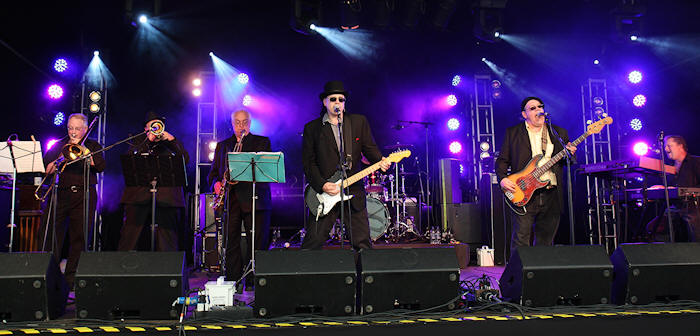
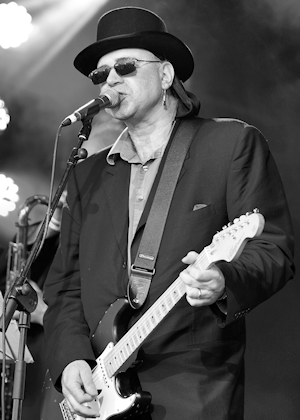 Alan:
Where do you come from and what are your first musical memories?
Alan:
Where do you come from and what are your first musical memories?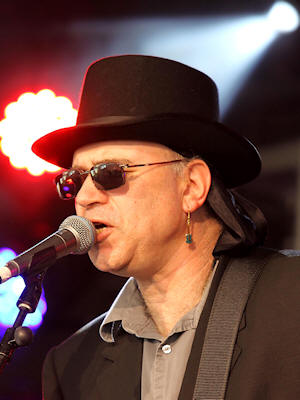 Alan:
Tell me a little about your musical journey so far, the bands, gigs
and albums along the way.
Alan:
Tell me a little about your musical journey so far, the bands, gigs
and albums along the way.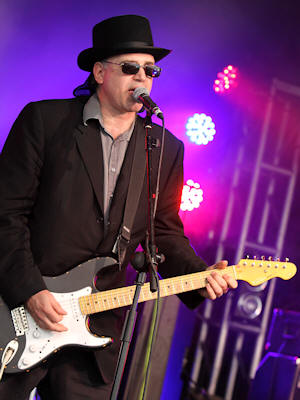 Alan:
What is your favourite guitar?
Alan:
What is your favourite guitar?